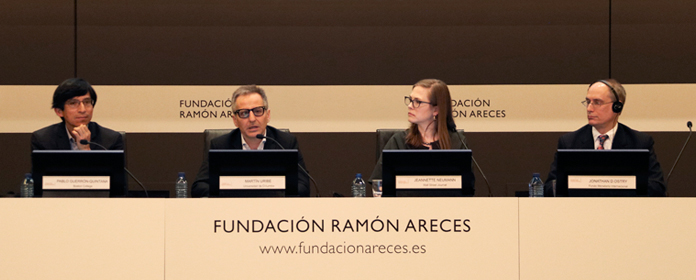European fiscal policy, uneven growth and Trump's policies, to discussion at roundtable of NCID's annual congress
A hundred people attended the event held at the headquarters of the Ramón Areces Foundation.

PHOTO: David Soler
The roundtable of the 7th NCID Research Workshop brought together some 100 people around top researchers to discuss current economic issues such as the future of wages in Europe, Trump's trade policy and the relationship between globalization and inequality.
The event was held on Thursday, May 17 at the headquarters of the Ramón Areces Foundation in Madrid and was attended by top-level guests. The three speakers were Martín Uribe, professor of Economics at Columbia University, Pablo Guerrón-Quintana, professor of Economics at Boston University and Jonathan D. Ostry, Deputy Director of area of research of the International Monetary Fund. The discussion was moderated by the Wall Street Journal 's correspondent in Spain, Jeannette Neumann.
Martín Uribe: "It is time to gradually raise the ECB interest rate to 2%".The roundtable began with a presentation of each speaker. In them, each economist presented a topic of his or her specialization program. Guerrón-Quintana focused his presentation on migration and assured that the economic impact of migration is very large: "If we eliminate migration between cities and states in the U.S., GDP would be reduced by 15%".
The Columbia University professor disclosed about the appropriateness of keeping the European Central Bank (ECB) interest rates at zero. In his opinion "it is time for the European Union to consider normalizing fees interest rates" and suggested gradually raising the rate to 2% interest, predicting a positive impact in the long term deadline.
The last participant, Jonathan D. Ostry, asserted that the greater the inequality, the worse and less durable the economic boom. "Fragile growth and inequality are two sides of the same coin. Growth is important, but achieving sustainable growth is the core topic, and that is not possible without correct distribution," said the IMF's researcher .
Jonathan D. Ostry on Trump's trade policy: "Free trade should not be touched, it is a positive universal value."After his questions, the moderator opened the round of questions, which began with a simple question: When will wages rise in Europe? Uribe took the floor to answer and asserted that with the current zero interest rate policy of the ECB, the risk of deflation is real and could affect wage growth. In addition, he assured that workers' remuneration did not fall with the crisis, which was bad: "In Spain between 2000 and 2008 wages grew by 60%, but despite the onset of the economic crisis they did not fall, causing a high unemployment rate".
The other great topic of discussion in the question and answer session was about the adequacy of the protectionist trade policy of the President of the United States, Donald Trump. Guerrón-Quintana expressed the insecurity felt by the economic sector since the arrival of the Republican candidate to power and Ostry asked not to touch free trade, which he considered a positive universal value.
Uribe specified that the United States has reasons to complain about China, but disagreed on the measures imposed by Trump. "China constantly violates international intellectual property regulation, but talking back by imposing tariffs on iron is like taking a pill for a tummy ache when you have a headache," he concluded.
